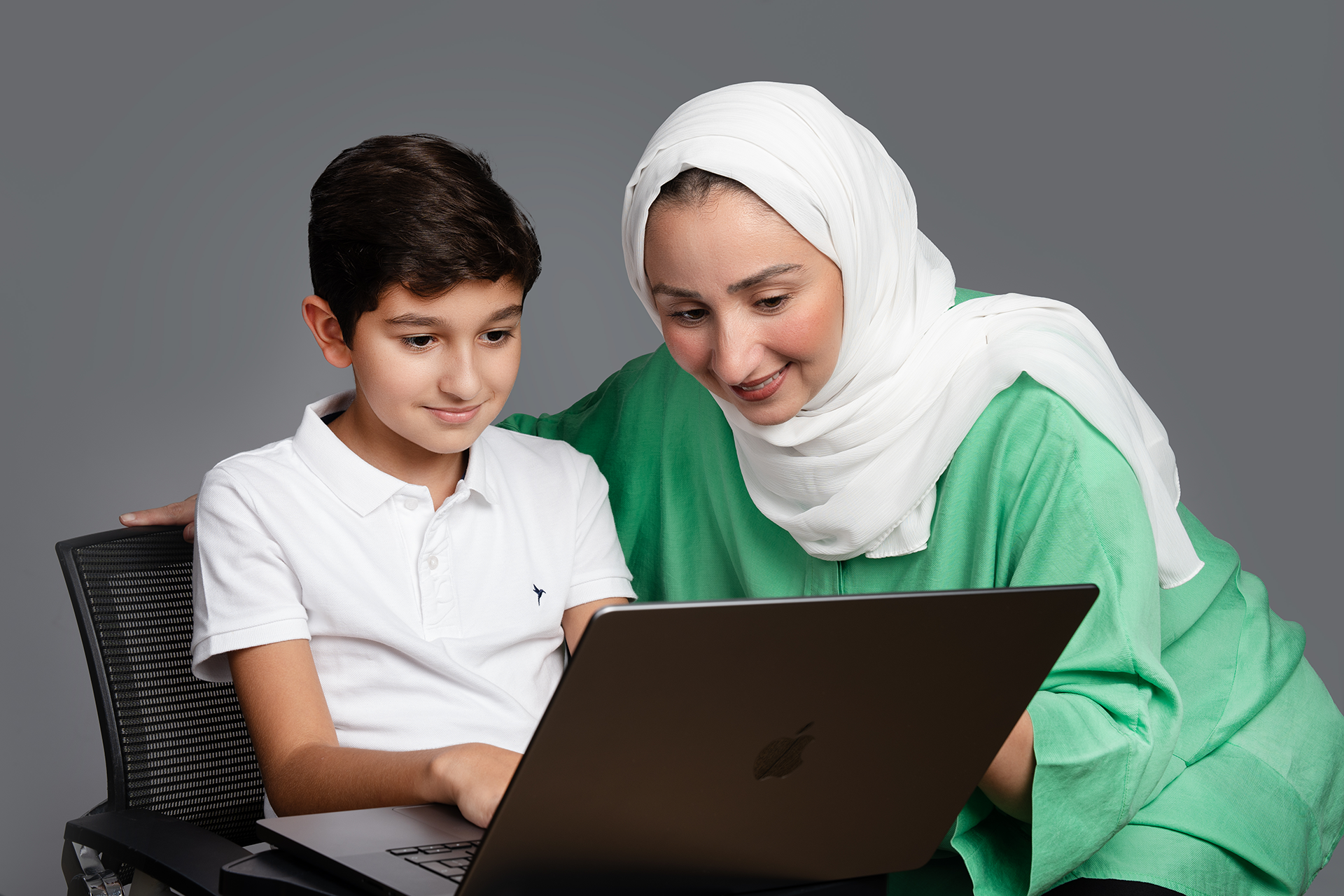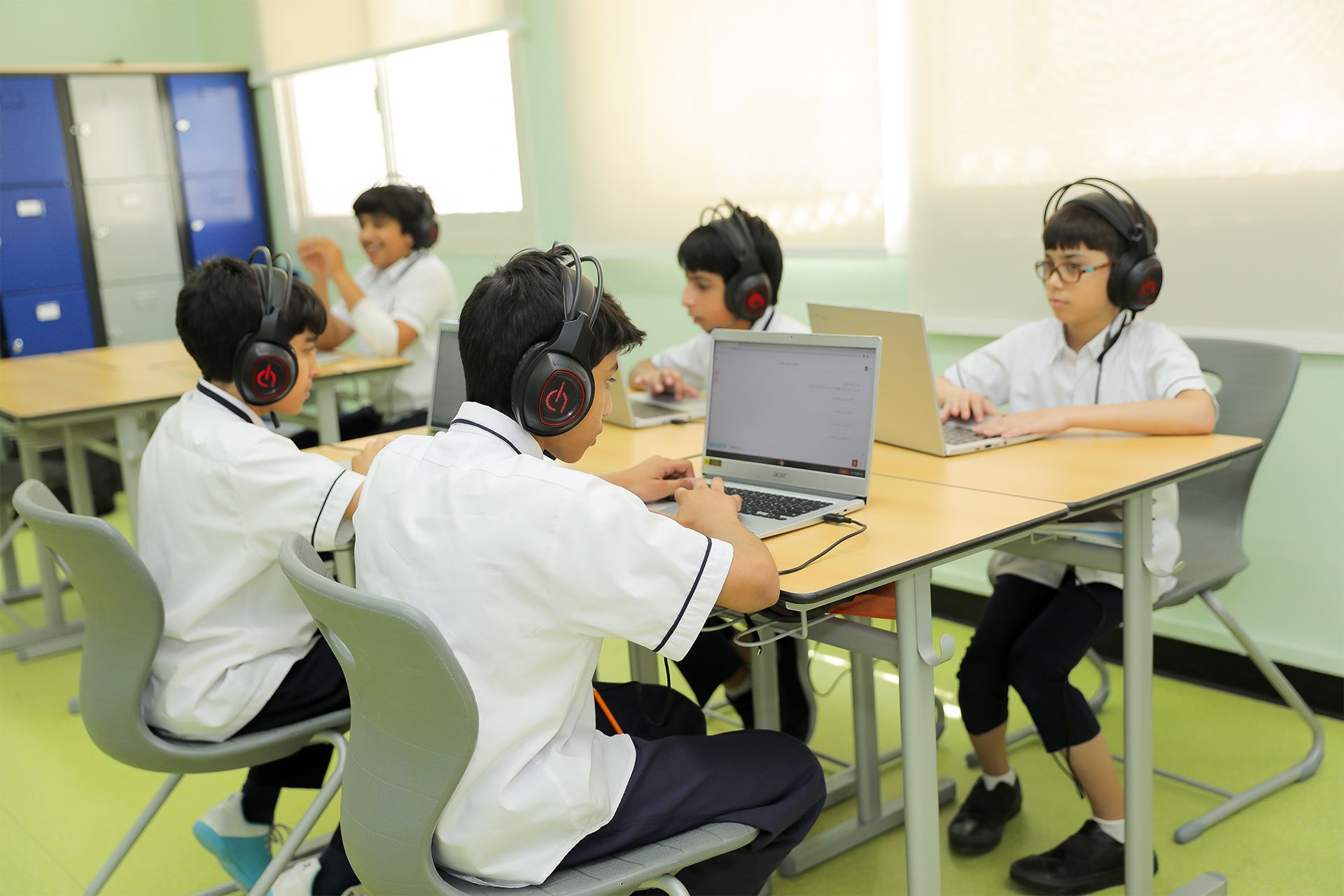At the moment, there are no entries available for display
Learners & Educators
Investors
Partners
Employees
Others

As an EdTech solutions provider partnering with governments and businesses, and crafting products and platforms used by students and educators alike; our purpose extends to creating value for all stakeholders in the learning ecosystem while transforming the future of education.
Our vision for sustainability is expressed through a comprehensive ESG strategy that is directly tied to our core business. It is an integral part of how we achieve that purpose sustainably and responsibly.
We have taken a holistic and collaborative approach to defining our ESG strategy , establishing a robust ESG Governance Framework
, and launching a number of strategic initiatives. Having established our ESG strategy last year, we embarked on a phased approach to operationalization. In 2024, we have laid the foundation for a number of landmark projects and kick-started several key initiatives.
We began by prioritising what matters to our stakeholders and our business: by looking inward and outward. We took stock of where we stood, and then envisioned where we wanted to be; in terms of creating value for our stakeholders. This involved honest conversations and in-depth consultations with experts, internal teams, partners, and customers. The process of short-listing ESG-related issues culminated in establishing a series of material topics , which have the greatest potential to impact both our company and the world around us.
Then we set out clear goals as a means to not only inspire action, but also ensure we hold ourselves accountable. It's not perfect, and we're still learning, but we're committed to continuous improvement. Because at the end of the day, a sustainable future is essential to achieving our mission and building a successful business. They're not mutually exclusive; they're two sides of the same coin.
Receiving Board-approval for our ESG strategy, in 2023, was just the beginning of a long-term journey. As an organisation, we are committed to continuous improvement, learning from our experiences, and setting increasingly ambitious goals.
Sustainability of our business is directly tied to the value we create for our stakeholders every day. It means ensuring our products, solutions, and initiatives meet their needs and expectations; while also addressing broader challenges in the education sector, the region, and across the globe.
We recognise the environmental footprint inherent to a technology-driven sector; primarily in the form of energy and emissions. Our environmental efforts directly address this; by optimising our own resource-use, and also exploring green technology opportunities that would minimise our indirect environmental footprint.
Equally important is our dedication to social responsibility. We are actively engaged in initiatives that promote diversity, equity, and inclusion within our organisation and beyond. By fostering a learning environment that embraces differences and empowers individuals, we aim to create positive social change that extends far beyond the boundaries of our company.
On the governance front, we are committed to upholding the highest standards of integrity, ethics, and transparency. Our governance practices are designed to ensure accountability and build trust among our stakeholders. By adhering to these principles, we aim to set a benchmark for responsible corporate practices in the EdTech sector.
We’re in EdTech and our target market consists of students, educators, governments, and private-sector institutions. They care about the learning and teaching experience; its quality, relevance, effectiveness, and at the end of the day – educational outcomes.
We serve customers across multiple geographies and employ teams in different countries. Since listing on the Abu Dhabi Stock Exchange, we are backed by a number of institutional and retail investors. Functioning at the forefront of the technology and education sectors; we are accountable to industry-specific and country-based regulatory bodies. These stakeholders expect credibility, trustworthiness, and reliability; they look to us to uphold ethical practices; and be transparent and accountable in our business dealings.
We place paramount emphasis on stakeholder engagement as a cornerstone of our operational strategy. Recognising the multifaceted nature of our impact, we actively engage with our stakeholders to build meaningful relationships that extend beyond the confines of our organisational structure. By seeking their input and feedback, we ensure our solutions are not only innovative but also align with their needs and perspectives.
One of the big challenges facing educators: How do you deliver relevant curriculum, at scale, in a rapidly evolving knowledge-landscape – in order to prepare students for tomorrow’s economy?
Things like digital transactions, Blockchain, Artificial Intelligence (AI), Machine Learning (ML); these fields are developing rapidly – with possibilities changing almost month to month.
As schools, and students, adopt technology into the structure of teaching and learning, it empowers development of crucial soft-skills, critical-thinking, and encourages exploration; all of which equip them for future careers. In addition, the content on our platform incorporates real-world examples and application from emerging fields; thereby introducing students to new concepts and future-fields.
Beyond the classroom, we work with leading institutions and government partners to deploy targeted initiatives, such as Alef Education’s Coding 101 program, or support wider projects such as the UAE AI Summer Camp. These and other initiatives have been made available to students across the UAE to provide early opportunities for skill development and ignite interest in tech-related careers.
The digital divide is another challenge facing the education sector, across the globe and even in the UAE. While the pandemic sped up digital adoption in many countries, it has also widened the digital divide: adding a new dimension to accessibility of education, which was already a significant barrier in many parts of the world.
We also take a multi-layered approach to enhancing accessibility that begins very early on. Inclusive platform design begins at conceptualization: maximising compatibility and testing and refining UI/UX to cater to a variety of learning styles. We also adhere to the Web Content Accessibility Guidelines (WCAG) that ensure content is more accessible to a broader range of learners, with accommodations for those who need additional support. Our platforms meet the WCAG 2.1 AA success criteria to provide the best possible experience for as many users as possible. When it comes to content: we incorporate a number of features like focused lessons to support critical skills, text and visuals that work together to support comprehension, simple, relatable contexts, and effective modeling to guide information processing. At point of delivery, we empower schools throughout the adoption process – providing teacher training, professional development, configuration assistance, and support to develop and implement accessibility strategies that ensure all students, regardless of background or location, stand to benefit.
We are continuously working with government, business partners, technology providers, and schools: to address accessibility challenges, introduce and deliver accessible and relevant content, support digital transformation ambitions, enable integration of technology in classrooms, and empower educators to better use EdTech for teaching and administration. Our social initiatives endeavor to go further: addressing accessibility challenges head-on by supporting access for underprivileged students and underserved communities.
As an EdTech player, we have a unique opportunity to equip youth with the knowledge and tools they need to navigate and respond to climate change: arguably the greatest global challenge facing our planet today.
The climate education content we produce, and the groundbreaking partnerships we’re forging, are doing just that. In 2024 we signed an MoU with the Kenya Institute of Curriculum Development (KICD) and UNICEF; to integrate climate change education into the curriculum in public schools across Kenya. We also joined other ICESCO member states, at COP29, to engage in conversations about empowering girls through climate action . Similarly, the Alef EcoChampsprogram, conducted alongside COP28 last year, reached students nationwide to raise awareness, attention, and responsibility about climate change.
The impending climate crisis threatens communities, ecosystems, and countries around the world. It demands a global response. We believe that raising awareness and inspiring action, through climate education, can be a critical weapon in our arsenal to combat climate change.
As a pioneer in the EdTech sector, we integrate sustainability perspectives into all our products and services, and constantly look for ways to bring this thinking into every aspect of the education process. We're also using our expertise to create accessible and scalable solutions for climate education. We collaborate with reputed organisations to create engaging and interactive learning experiences that are founded on scientific findings and rooted in real-world lessons. The Alef Platform, and other digital education frameworks, can bring recognised and well-crafted climate education content to students in even the most remote areas.
Partnering with the private sector, governments, and non-government actors, is critical to advancing our vision. These collaborations allow us to pool resources, share expertise, and implement innovative educational solutions; ensuring critical issues like climate change receive the attention they deserve. For example, we played a key role in developing the Educators’ Voice initiative launched by the Ministry of Education: a platform that recognised the efforts of educators to promote climate awareness and integrate climate change issues into the core-curriculum.
We prioritise data security and data privacy at every level, following industry-leading standards and guidelines, and ensuring strict compliance with all related regulations.
Our ISO 27001 certification for Information Security Management is testament to the systematic approach, robust security measures, and advanced encryption protocols we employ.
We are fully compliant with the Family Educational Rights and Privacy Act (FERPA), the Children’s Online Privacy Protection Act (COPPA) in the U.S., and the General Data Protection Regulation (GDPR), which is considered the gold standard in data protection. We also adhere to requisite data classification and protection measures, including those requiring localising to relevant cloud data center regions.
Guided by a detailed Information Risk Management Policy that informs our risk assessment and mitigation strategies, we ensure secure storage of data in the cloud, have stringent access controls and detailed network and endpoint policies, and conduct continuous awareness programme for employees to maintain the highest levels of cybersecurity.
To further strengthen our data security management system, we have established a three-year roadmap encompassing six security pillars: Governance, Risk and Compliance (GRC), Identity and Access Management (IAM), Application Security, Infrastructure Security, Security Operations Centers (SOC), and Data Protection. Within the context of Data Protection, we implement a number of safeguards aligned with international guidelines.
We also utilise advanced encryption methods to protect user data in transit and at rest; ensuring sensitive information remains confidential and protected from unauthorised access. As part of our cybersecurity protocol, we conduct regular security audits and penetration testing; which allow for identification and prompt remediation of any vulnerabilities. In addition, managed security services and a robust incident management system aim to uphold security standards across the board while providing required support to our customers. In addition, we work to educate the users of our platforms and products – parents, teachers, and students; by promoting best-practices and raising awareness on cybersecurity.

The ESG strategy reflects Alef Education’s purpose and impact. It goes beyond financial returns, aligns with our mission and core values, focuses on all stakeholders in EdTech ecosystem, and is in harmony with our overall strategy and management approach.
We have identified key priorities for our Company under the Environmental, Social, and Governance pillars, and set ourselves clear and ambitious targets for 2025 through to 2030. This five-year horizon not only aligns with Abu Dhabi’s Economic Vision 2030, but also gives us the opportunity to develop, establish, and refine best-practices; track progress against clear metrics; and measure the impact of our efforts.
On the environmental front, we’re tackling emissions, energy-use, and climate-related risks; alongside responsible resource utilisation. Socially, we’re passionate about expanding access to education, supporting our communities, and building a diverse, inclusive culture within our operations. Our governance initiatives focus on upholding ethics, ensuring data security, and mainstreaming our ESG initiatives.
Collectively, our ESG initiatives align with Alef Education’s core business: ensuring we are responsible stewards of our financial and non-financial resources, well-positioned to lead the field in our target markets, and capacitated to deliver tangible value to the stakeholders we serve.

Adding value without compromising our planet
Emissions, Energy, Climate Risk
Ensures we have a positive impact on the environment while not losing sight of commercial imperatives
Actively promoting energy efficiency and emissions reduction through a series of well-thought-out initiatives
Fostering positive impact through robust policies, widespread awareness, and direct action to address our environmental footprint.
Tracking GHG emission and improving where possible
Developing a climate risk training program
Developing an Environment policy
Implementing an electronic recycling program
Implementing a device donation program
Managing the delivery of our ESG ambitions
Data Privacy, Board Independence, ESG Oversight, Conflict of Interest, Whistleblowing, Ethics and Prevention of Corruption, Innovation and Technology Impact, Supplier Code of Conduct
The integrity of our business is intrinsically linked to how we promote ethical conduct and transparency, ensure responsible business practices, and incorporate stakeholder and sustainability considerations within our core decision-making.
We uphold our commitment towards ethical behavior, transparency and accountability. This is reflected in our values, organization culture, stakeholder relations and all other endeavors. We firmly believe that committing to the highest standards of governance along with novel solutions will enable us to create an ethical environment for all our stakeholders.
Championing Responsible Business involves prioritizing ethical practices, sustainability and social impact within the corporate landscape. We as a responsible business not only seek financial success but also strive to minimize our environmental footprint, uphold ethical standards in our operations and contribute positively to the communities we serve. We also protect data and respect privacy along with managing supply chains.
Embedding ESG into decision making process - Governance and Risk as investment criteria
Maintaining Board independence
Enforcing 0% compliance trainings completion
Establishing independent Whistleblowing channels
Enforcing 0% InfoSec training completion
Strengthening Health and Safety programme
Developed 3rd party Code of Conduct
Embedding ESG into decision making process - Governance and Risk as investment criteria
Take a look at some of our sustainability wins: the projects we're most proud of, and the tangible impact we're making in pursuit of our multidimensional vision for sustainability.
Enhancing climate literacy, at scale, by integrating climate and sustainability education into core-curriculum, and deploying high-quality learning modules through cloud and digitally-enabled platforms. Partnering with the governments and international organizations to deliver climate education content to over 250,000 students in 4,000 public schools across Kenya.
2024 |
||
|
0,000 |
0,000 |
0 |
Addressing the global climate crisis requires concerted and widespread action; which begins with awareness. Climate change education and climate literacy is an essential component of empowering youth; who will not only take up the challenge, but also inherit the consequences of inaction.
In 2024, we signed a groundbreaking MoU with the Kenya Institute of Curriculum Development (KICD), and UNICEF to integrate climate change education into the curriculum in public schools across Kenya. The partnership will deliver high-quality digital content for climate education through KICD’s Kenya Education Cloud platform, aiming to empower students and educators with the knowledge and skills needed to address the climate crisis.
The project, conceptualised in 2023 and initiated in June 2024, is expected to reach students in public schools across Kenya.

Actively reducing our environmental impact through employee awareness, waste reduction, resource efficiency, recycling, and responsible reuse/repurposing practices.
During 2023, we coordinated with ADEK to donate 1,500 depreciated devices and 10 charging carts to Al Falah Academy; enabling their students to complete online exams. We donated an additional 1,000 devices in 2024. The initiative has now supported approximately 35% of the student body at the schools.
Al Falah Academy works to provide education opportunities for students from low-income families who face obstacles in accessing education. The school maintains very low and uniform fees for all stages of education, from Kindergarten to twelfth grade; and currently supports 7,000 students through two schools located in Abu Dhabi and Al Ain.
2024 |
|
|
0,0 kg |
0,000 |
A comprehensive environmental policy, employee awareness programmes, and targeted resource-management initiatives have contributed to successful management of the Company’s environmental footprint: resulting in reduction of single-use plastics, paper, water, and energy.
We have also set up responsible waste segregation throughout our operations, including for e-waste. This has enabled formalised partnerships with reputed third-party contractors and recyclers through for responsible waste disposal and/or recycling.

Educators’ voice is an initiative between the UAE MoE and Alef Education, aimed at empowering educators worldwide and supporting both their professional development and climate projects.
This initiative seeks to highlight the work of educators to global politicians and decision-makers, shedding light on the challenges they face and the crucial role they play in the global climate response.
The project introduced a registration system for 386 worldwide applicants to showcase sustainable projects, along with a dashboard for tracking of these applications. In the second phase, the Educators’ Voice Platform was introduced as a centralised hub for professional development and resource exchange, and connecting to more than 20,000 educators dedicated to green education around the world.